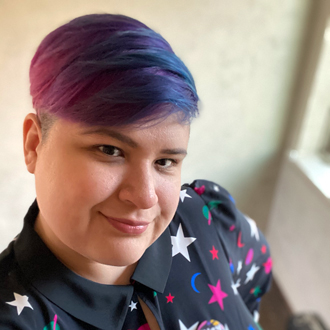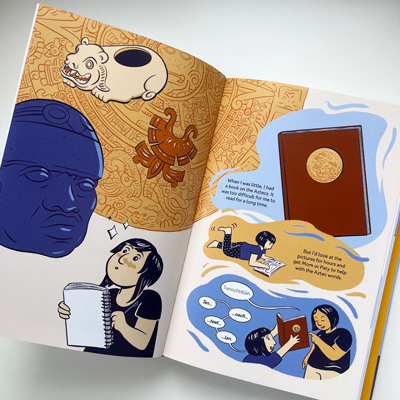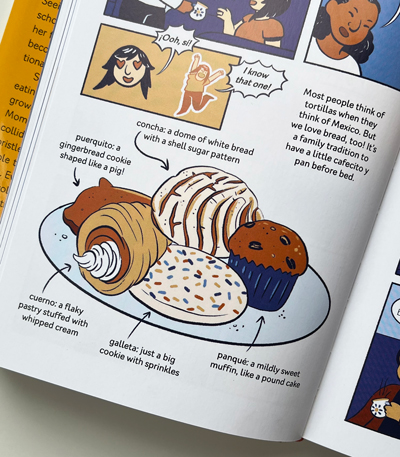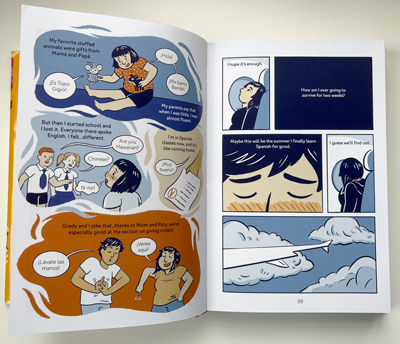
Christine Suggs
2015, B.F.A., Communication Design: Graphic Design
Senior Visual Designer, Allstate Insurance
Author: "¡Ay, Mija! My Bilingual Summer in Mexico"
Instagram: CSuggsIllustration
LinkedIn: Christine Suggs
Pronouns: they, them, theirs
Please tell us a bit about yourself.
I'm an illustrator, comic artist, and designer living in Dallas. My first graphic novel, "¡Ay, Mija! [Oh, Dear!] My Bilingual Summer in Mexico," came out in April 2023 from Little Brown Ink. It's a young adult memoir about the summer I spent in Mexico with my grandparents and tia [aunt], even as I struggled with Spanish and felt like I was "not Mexican enough." I've also had many comics published by the "Washington Post" in their gender & identity section. My work focuses on the intersectionality of my identities, namely being a queer, fat, Latine artist.
![Cover of a book titled "!Ay, Mija! [Oh, darling] My bilingual summer in Mexico](https://news.cvad.unt.edu/sites/default/files/suggs-christine-1.jpg) What are your thoughts about keeping art and design in K-12 and higher education curricula?
What are your thoughts about keeping art and design in K-12 and higher education curricula?
My second book is about the profound barriers that exist in art education. I grew up in a small town without access to art museums and other cultural experiences. Our small art department struggled while the football team miraculously had more and more funding each year. At the end of my junior year in high school, I attended a pre-college program where I took an illustration course at a private art school. It was an incredible experience, but it also made me realize just how financially out of reach art school was for me. Fortunately, my grades were strong enough to attend UNT via a large grant that essentially covered tuition. Even in college, I saw how income affected students' success: the kids with multiple jobs struggled and often dropped out. To be perfectly honest, I think a large factor in my success at school was that I lived with my then-boyfriend, who was financially comfortable and thus didn't have to pay rent and get a job. I look back at my story and think of all the students who didn't luck out and how many are limited in their career choices by circumstance, income, and crushing student debt.
 What have you done in your career where you weren’t sure what the result of the outcome would be?
What have you done in your career where you weren’t sure what the result of the outcome would be?
The entire experience of writing a book was so nerve-wracking! I'd been making short-form comics for Instagram for over 10 years. I knew nothing about pacing out a full-length graphic novel. I sometimes felt as if I didn't have the right background for comics or the right books on my shelves for inspiration. But I jumped in with both feet, deciding to trust my gut. And, yeah, I made tons of mistakes! I faced characters the wrong way (apparently, they should be moving to the right when the story is going forward), my written Spanish was an absolute grammatical mess, I had no idea how to color, and so I totally hid behind a limited color palette (thanks, graphic design degree) and I had so many moments where I just laid down and wallowed in doubt. But the result is something I'm endlessly proud of. One of my favorite moments was when I was messaged by a fellow cartoonist who said they couldn't get my book out of their head. It felt like vindication, like all my guesswork had panned out, and maybe my gut was worth listening to. I'm trying to hold onto this feeling as I work on book two!
 If you could go back, would you choose the same profession, specialty, etc.?
If you could go back, would you choose the same profession, specialty, etc.?
Yes. After college, I took many different kinds of jobs, and each experience taught me something about myself and what I wanted. Some were too slow and left me mind-numbingly bored; some were way too intense and left me insecure about my creativity and with no energy to pursue my comics work on the side. This is all part of turning the dial: you will want different work environments for different times of your life. I was scrappy enough to handle that intense job because I was in my 20s and had something to prove. But eventually, I wanted a job with better work-life balance, pay, and benefits as I was looking to expand my comics career and, eventually, my family. I was able to find a job like that, and I remember very clearly sitting down to make a list of goals. I wrote down all the comic publications I wanted to work with, news sites to start pitching to, rough ideas for developing a book, etc. I set a schedule, gave myself fake illustration assignments, and doubled down on my social media. A few weeks later, I got my first gig with the Washington Post. A few months later, I had editors from two different publishing houses in my DMs. It felt incredibly lucky, but looking back, I know I had to cultivate those circumstances over several years.
 We often hear about learning lessons – but, frequently, un-learning a lesson is just as important. Have you ever had to unlearn a lesson? Can you tell us that story?
We often hear about learning lessons – but, frequently, un-learning a lesson is just as important. Have you ever had to unlearn a lesson? Can you tell us that story?
One thing the comm design program really drills into you is doing TONS of sketches. And I think early on in your career; it's super important to build those creative muscles. But one thing you realize as your career continues is that you're allowed to edit yourself. In fact, it eventually becomes necessary. Your boss or editor probably hasn't time to sift through 100s of options. After a while, your brain starts to self-edit and put the best ideas first. It's a satisfying feeling when you can work faster and faster and still get great results.
Is there a mission driving your creative journey?
I write a lot about identity, usually from an autobiographical lens. Part of it is just how I process my feelings. But a lot of it is education. I want to make work that helps people understand others better and cultivate empathy. If I can make the experience of a trans, Latine, or fat person just a little bit easier by making work that lets people know our struggles and how not to be a jerk, then I've done my job.
Was there ever a moment in a critique or class that made you think you should give up your art dreams, and if so, how did you get past that? Did that provide a lesson for your career?
Oh gosh, I nearly dropped out every single semester! I had quite a chip on my shoulder about not being able to pursue illustration as a career. I knew design was a safer choice than going into massive amounts of debt at a private art school followed by scrounging for freelance, but still, I felt a lot of what I would call "Disney-fied" follow-your-dream type pressure to go for it. At the same time, as a child of an immigrant, I knew I had financial responsibilities and wanted to cultivate a career with security. Many many thanks to Karen Dorff, who sat me down and talked me off the proverbial ledge many times. And although I struggled with my career in my early 20s, I eventually learned that it's possible to have a stable income, pursue comics, and still have time to go on a date with your cute husband.
